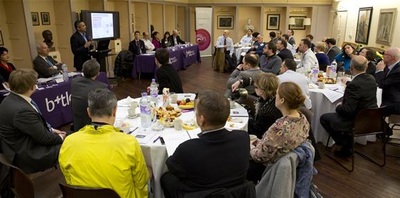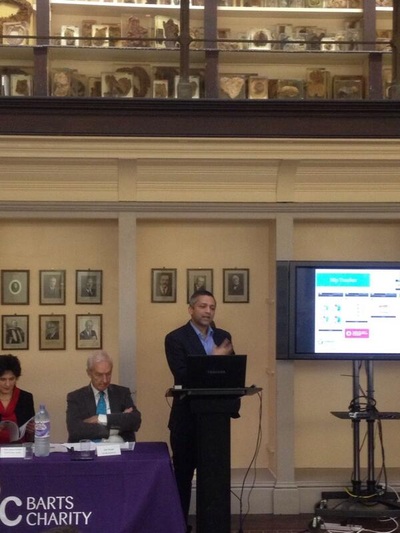The Bespoke injuries database project 2014
bespokestudy.co.uk - our study website
http://collideosco.pe/ - our injuries and near misses web app
Launch
The project was first expanded via an appeal at the inaugural Barts Charity Seminar in January 2014 hosted by presenter and cycling champion Jon Snow, which posed the question: “Can advances in medicine and research at Barts Health impact the number of killed or seriously injured people from cycling incidents? The presentation on the problems with data collection in cycling injuries can be seen here.
Background
A hotly debated topic with wider implications across health, the environment and the economy, for individuals, for society and politically, the seminar on 31st January 2014 brought together a unique group of experts and thought-leaders from a broad range of disciplines. Experts on data collection and analysis, trauma, rehabilitation and cycling from Barts Health NHS Trust and beyond gave presentations on four key topics, followed by round-table discussions and conclusions. This resulted in a truly exceptional event with some shocking revelations, alongside real ideas for innovations for change.
The unfortunate reality is that our knowledge is extremely limited, especially for less serious incidents and less severe injuries, which sit under the tip of an enormous iceberg….. Currently we obtain data from a variety of sources, but all have their shortcomings. For example, the trauma and emergency teams collect data on the sex of a patient, the types of injuries sustained and whether a vehicle was involved. However, we could be gathering information about the road layout, whether there was a pothole in the road, whether the person was wearing high-vis clothing, the location of the incident, the type of vehicle involved, the events leading up to the incident, how much cycling experience the person had, the weather conditions….the list goes on.
Unsurprisingly data on deaths is the most robust, and the good news is that mortality is going down. In fact, over the last 27 years, all transportation related deaths have fallen. However, cycling as a percentage of transport deaths has increased. Why? We’re not sure, but with better data we can understand the factors involved and answer this question with authority. Shouldn’t all cyclists and road users be better informed? It is easy to speculate, but it is only knowledge that will offer the best chances of taking control of our safety, our children’s safety and the safety of other road users.
Innovation
We are in the early stages of an exciting project - to create the UK’s first tailor-made database for detailed injury data collection, enhanced by an innovative smartphone-based app to collect data from patients. This would arm us with more knowledge than we’ve ever had about the circumstances surrounding injury. Using cyclists treated at the Royal London Hospital as a starting point, the project would extend to victims of all road traffic collisions, falls, interpersonal violence, and playground and sporting injuries. The potential of such a project is huge, the ultimate aim being to create a near real time database of serious injuries across the UK. This would result in effective injury prevention, impacting death and injury from trauma nationally – currently the biggest killer of children and young adults
Aim
To build a prospective database of the circumstances surrounding major injury to provide insights into injury and how to prevent it, including road traffic and cycling incidents, falls, playground and sporting injuries.
Objectives
1. To capture detailed information about all major injuries at RLH over a 12 month period
2. Record information in a comprehensive database, bespoke for this purpose
3. Provide data for ‘geomapping’ of injury hotspots and to develop effective injury prevention strategies
Methods
1. Data collected on: Demographics e.g. age, gender, ethnicity, occupation.
Background e.g. what happened before event, location, whether protective / high vis clothing was worn.
Mechanism e.g. did the cycling incident involve an HGV, pedestrian or car?
Injury pattern e.g musculoskeletal, plastic, neurological, thoracic, abdominal.
Treatment/intervention required e.g. high dependency unit, intensive care unit admissions
2. A standalone web/smartphone-based app to record patient-related outcome and detailed mechanistic data, enabling patients to provide information at their convenience on causes and effects of their injuries
3. All ‘bespoke’ data fed into a database incorporated into the central hospital system for frontline recording and care
Impact
This would be the first UK project to record detailed trauma data enhanced by smartphone-based data from patients on their own experiences, providing new information for geomapping and on the health cost of the financial and social impact of major injuries. This will offer novel insights to inform effective prevention strategies. After 12 months and with further funding, the project has the potential to be expanded across the UK, with the ultimate aim of creating a near real time database of serious injuries nationally, impacting death and injury from trauma.
Press
Evening Standard article project launch with Jon Snow September 19th 2014
ITV News coverage of Collideosco.pe app launch October 6th 2014
London Cycling Campaign October 8th 2014
Evening Standard interview with Alex Dowsett Team GB cyclist about Bespoke October 17th 2014
Road.cc article October 18th 2014
Civic Exchange October 21st 2014
bespokestudy.co.uk - our study website
http://collideosco.pe/ - our injuries and near misses web app
Launch
The project was first expanded via an appeal at the inaugural Barts Charity Seminar in January 2014 hosted by presenter and cycling champion Jon Snow, which posed the question: “Can advances in medicine and research at Barts Health impact the number of killed or seriously injured people from cycling incidents? The presentation on the problems with data collection in cycling injuries can be seen here.
Background
A hotly debated topic with wider implications across health, the environment and the economy, for individuals, for society and politically, the seminar on 31st January 2014 brought together a unique group of experts and thought-leaders from a broad range of disciplines. Experts on data collection and analysis, trauma, rehabilitation and cycling from Barts Health NHS Trust and beyond gave presentations on four key topics, followed by round-table discussions and conclusions. This resulted in a truly exceptional event with some shocking revelations, alongside real ideas for innovations for change.
The unfortunate reality is that our knowledge is extremely limited, especially for less serious incidents and less severe injuries, which sit under the tip of an enormous iceberg….. Currently we obtain data from a variety of sources, but all have their shortcomings. For example, the trauma and emergency teams collect data on the sex of a patient, the types of injuries sustained and whether a vehicle was involved. However, we could be gathering information about the road layout, whether there was a pothole in the road, whether the person was wearing high-vis clothing, the location of the incident, the type of vehicle involved, the events leading up to the incident, how much cycling experience the person had, the weather conditions….the list goes on.
Unsurprisingly data on deaths is the most robust, and the good news is that mortality is going down. In fact, over the last 27 years, all transportation related deaths have fallen. However, cycling as a percentage of transport deaths has increased. Why? We’re not sure, but with better data we can understand the factors involved and answer this question with authority. Shouldn’t all cyclists and road users be better informed? It is easy to speculate, but it is only knowledge that will offer the best chances of taking control of our safety, our children’s safety and the safety of other road users.
Innovation
We are in the early stages of an exciting project - to create the UK’s first tailor-made database for detailed injury data collection, enhanced by an innovative smartphone-based app to collect data from patients. This would arm us with more knowledge than we’ve ever had about the circumstances surrounding injury. Using cyclists treated at the Royal London Hospital as a starting point, the project would extend to victims of all road traffic collisions, falls, interpersonal violence, and playground and sporting injuries. The potential of such a project is huge, the ultimate aim being to create a near real time database of serious injuries across the UK. This would result in effective injury prevention, impacting death and injury from trauma nationally – currently the biggest killer of children and young adults
Aim
To build a prospective database of the circumstances surrounding major injury to provide insights into injury and how to prevent it, including road traffic and cycling incidents, falls, playground and sporting injuries.
Objectives
1. To capture detailed information about all major injuries at RLH over a 12 month period
2. Record information in a comprehensive database, bespoke for this purpose
3. Provide data for ‘geomapping’ of injury hotspots and to develop effective injury prevention strategies
Methods
1. Data collected on: Demographics e.g. age, gender, ethnicity, occupation.
Background e.g. what happened before event, location, whether protective / high vis clothing was worn.
Mechanism e.g. did the cycling incident involve an HGV, pedestrian or car?
Injury pattern e.g musculoskeletal, plastic, neurological, thoracic, abdominal.
Treatment/intervention required e.g. high dependency unit, intensive care unit admissions
2. A standalone web/smartphone-based app to record patient-related outcome and detailed mechanistic data, enabling patients to provide information at their convenience on causes and effects of their injuries
3. All ‘bespoke’ data fed into a database incorporated into the central hospital system for frontline recording and care
Impact
This would be the first UK project to record detailed trauma data enhanced by smartphone-based data from patients on their own experiences, providing new information for geomapping and on the health cost of the financial and social impact of major injuries. This will offer novel insights to inform effective prevention strategies. After 12 months and with further funding, the project has the potential to be expanded across the UK, with the ultimate aim of creating a near real time database of serious injuries nationally, impacting death and injury from trauma.
Press
Evening Standard article project launch with Jon Snow September 19th 2014
ITV News coverage of Collideosco.pe app launch October 6th 2014
London Cycling Campaign October 8th 2014
Evening Standard interview with Alex Dowsett Team GB cyclist about Bespoke October 17th 2014
Road.cc article October 18th 2014
Civic Exchange October 21st 2014



